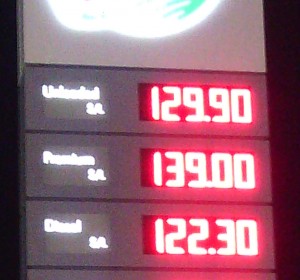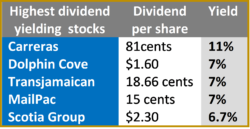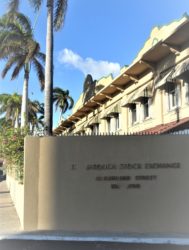The Statistical Institute of Jamaica reported negative inflation of 0.6 percent for March, for a second consecutive month and point to point inflation of 5.6 percent to the year to date and follows and negative inflation of 0.6 percent in February and negative 0.10 in January.
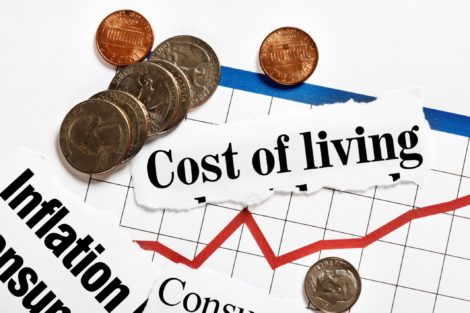 With most businesses having granted healthy wage increases in 2022 and 2023, this publication does not expect there to be much wage pressure on inflation this year. With the inflation rate for the first three months of the year now at negative1.3 percent, which could climb even more in April, the increases in the summer months that usually flow from farm produces is likely to wipe out the gains in the early months but that should set the stage for the point to point to continue to trend to the lower end of BOJ’s mandate of 4 to 6 percent.
With most businesses having granted healthy wage increases in 2022 and 2023, this publication does not expect there to be much wage pressure on inflation this year. With the inflation rate for the first three months of the year now at negative1.3 percent, which could climb even more in April, the increases in the summer months that usually flow from farm produces is likely to wipe out the gains in the early months but that should set the stage for the point to point to continue to trend to the lower end of BOJ’s mandate of 4 to 6 percent.
Bank of Jamaica has taken note of the inflation outturn in March 2024. According to a released by the central bank, “the 12-month point-to-point inflation (March 2023 to March 2024) was 5.6 per cent, which is within the Bank’s target range. The Bank welcomes the reduction in headline inflation, which was 0.6 percentage points lower than the 6.2 per cent point-to-point inflation rate for the period February 2023 to February 2024 and also lower than our most recent forecast”.
“The Bank notes that this is the second consecutive month of decline in headline inflation, which is a positive development, and the first time that the inflation outturn was within the Bank’s target range since October 2023.”
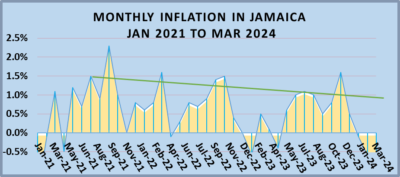 The bank went on to state “the analysis of the inflation numbers shows that the downward movement in the Consumer Price Index, for March 2024 was largely influenced by a 1.8 per cent decline in the index for the heaviest weighted division, Food and Non-Alcoholic Beverages. While the Bank had anticipated a decline for this division, the contraction was larger than expected and reflected reductions in the prices of some agricultural produce, such as tomato, yam, sweet potato, cabbage and carrot.”
The bank went on to state “the analysis of the inflation numbers shows that the downward movement in the Consumer Price Index, for March 2024 was largely influenced by a 1.8 per cent decline in the index for the heaviest weighted division, Food and Non-Alcoholic Beverages. While the Bank had anticipated a decline for this division, the contraction was larger than expected and reflected reductions in the prices of some agricultural produce, such as tomato, yam, sweet potato, cabbage and carrot.”
“The Bank’s Monetary Policy Committee will continue to closely watch the inflation numbers and other incoming data over the ensuing months to assess the extent to which the current level of inflation will be sustained, before making a determination on whether to change the Bank’s monetary policy stance’ the statement concluded.
Inflation plunges to 5.9% in past year
Inflation over the past twelve months plunged to 5.9 percent data from the Statistical Institute of Jamaica states. The drop was occasioned by a 0.5 percent rise in inflation for September down sharply from 1.4 percent in September last year. The fall follows a jump in August to 6.8 percent from 6.6 percent to July.
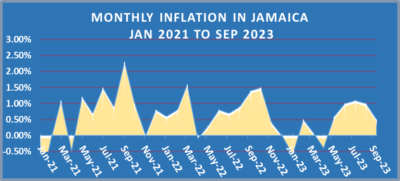 If the rate for September holds or falls in October the twelve month rate will fall below 5 percent.
If the rate for September holds or falls in October the twelve month rate will fall below 5 percent.
According to Statin, the main contributor to September’s movement was an 11.8 per cent rise in the index of the ‘Education’ division, due to higher tuition fees for private schools at the primary level. The inflation rate was also impacted by the 0.7 per cent ‘Transport’ division mainly as a result of higher petrol prices. The index for the heavily weighted ‘Food and Non-Alcoholic Beverages’ division went up by 0.1 percent. However, there was a 1.9 per cent decline in the index ‘Vegetables, tubers, plantains, cooking bananas and pulses’ class and this tempered the overall increase of the division.
Inflation in Jamaica rises in June
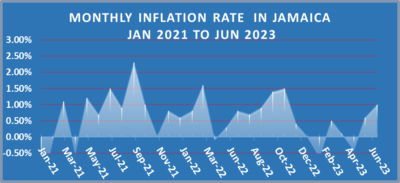 Inflation in Jamaica climbed by one percent in June over May, fueled by a spike in food prices, furnishings, household equipment and routine housekeeping and restaurant and accommodation services that rose 4.2 percent.
Inflation in Jamaica climbed by one percent in June over May, fueled by a spike in food prices, furnishings, household equipment and routine housekeeping and restaurant and accommodation services that rose 4.2 percent.
Inflation for the past two months is slightly higher than the same period in 2022, with June this year being partially pushed by the sharp increase in the minimum wage.
Point to point inflation rose from 6.1 percent in May to 6.3 percent, while the fiscal year inflation to date ended at 1.6 percent to June or 4.8 percent per annum if the current rate were to continue to March 2024.
Interest rates held at 7% for Jamaica
Interest rates set by the Bank of Jamaica held at 7 percent for the overnight deposits, even as inflation continues to fall rapidly in the country and now running at an average of 0.20 percent per month or 2.4 percent annualised since November last year. The monetary Policy Committee determined the decision at meetings held this week.
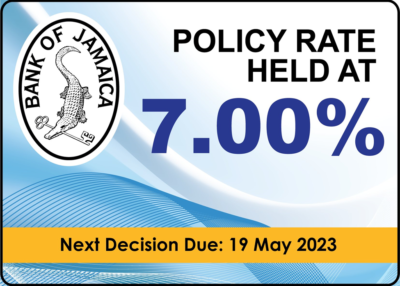 According to the country’s central bank, “Inflation continued to ease, consistent with Bank of Jamaica’s monetary policy and international developments. Jamaica’s inflation rate to February 2023 of 7.8 percent was below the rate of 8.1 percent at January 2023. The February outturn was the lowest rate since December 2021.”
According to the country’s central bank, “Inflation continued to ease, consistent with Bank of Jamaica’s monetary policy and international developments. Jamaica’s inflation rate to February 2023 of 7.8 percent was below the rate of 8.1 percent at January 2023. The February outturn was the lowest rate since December 2021.”
The key external drivers of headline inflation, such as grains, fuel and shipping prices, continued to decline, broadly in line with the Bank’s expectations. In addition, inflation expectations continued to track.
Core inflation (excluding food and fuel prices from the Consumer Price Index) at February 2023 also decelerated to 6.6 percent from 7.1 percent at January 2023 and is projected to fall further as monetary policy remains tight.
Annual inflation is projected to continue to fall to the Bank’s inflation target range of 4 to 6 percent by the December 2023 quarter. One-off regulated price adjustments may, however, result in a temporary uptick in inflation.
Notwithstanding positive developments in inflation, “the MPC noted that the risks to the inflation outlook remain elevated. In a context where the domestic economy continues to grow, labour market shortages carry the potential for future wage adjustments that can put upward pressure on inflation.
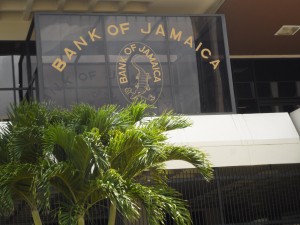
BOJ holds overnight rate.
Higher inflation could also result from a worsening in supply chain conditions and higher commodity prices if there are further geo-political disruptions. Among the factors that could lead to lower-than-projected inflation, weaker-than-expected global growth could negatively affect domestic demand, and some projected adjustments to regulated prices may not materialise.”
“Therefore, to continue underpinning inflation returning to the target range and to underwrite continued stability in the foreign exchange market, the MPC unanimously agreed to hold the policy interest rate at 7 percent, to maintain tight Jamaican dollar liquidity in the money market and to continue fostering relative stability in the foreign exchange market. The Bank’s liquidity management strategy incorporates the impact of the one percentage point increase in the domestic and the foreign currency Cash Reserve Requirements applicable to DTIs, effective the beginning of April 2023.”
BOJ’s several missed inflation forecasts
Bank of Jamaica has done an awful job of telling the truth about inflation in Jamaica since early 2021 and the bank’s management of the tools to combat it. The impression given is that inflation continues to run at nearly ten percent per annum for most of this year, but that is false. According to data released by Statin since January, inflation is running at just under 6.5 percent per annum, not the ten percent the bank is consistently mentioning in its reports and recently reduced to 9.3 percent.

BOJ interest cuts overnight rate.
It is not that interest rates should not have been increased, the question is the extent of it and how long it may go on. It also means that they have been applying the incorrect dosage of interest rates medicine to inflation that has subsided since the start of the year. The reality is that the terribly high inflation rate was up to September last year, not in 2022, although they were some high months this year but not as high as the comparative periods last year.
Come December or January, the country will be told that inflation has suddenly plummeted to the 6 percent level because the bad periods for 2021 are no longer in the data set. The decline will have had little to do with Bank of Jamaica’s interest rate hike, but as sure as night follows day, the central bank will be praised for its action in bringing the inflation rate sharply down. That of course will be far from the truth.
The reality is that just about every public forecast by the country’s central bank since the beginning of last year proved to be wrong. It started with a letter written to the Minister of Finance in March last year in defending the maintenance of the 4-6 percent target for three years. In May of that year BOJ stated that while inflation is forecasted to rise further over the next two months, the Bank forecasts inflation to fall in the second half of the year, consistent with the consensus forecast for a fall in commodity prices. Immediately after that statement, the inflation rate declined in the following two months.
The classic case of getting wrong is BOJ’s letter to the Minister of Finance in 2021.
“I am recommending that the target for the 12 months point to point in the spread as measured by the percentage change in consumer price index remains at 4 percent to 6 percent for the next three fiscal year,” this is an extract from a letter written to the Minister of Finance by Richard Byles head of the Monetary Policy Committee (MPC ) of Bank of Jamaica dated March 29th 2021, the letter went on to state “the targeted lower rate of inflation is not advisable as achieving this lower rate will require tighter monetary policy which will restrain the anticipated recovery in the Jamaican economy and impair the government’s debt reduction strategy. “
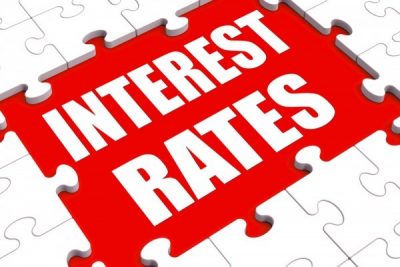 By May of 2021, the central bank changed its position, informing the nation that tighter monetary policy would be put into effect and that the overnight rate would be raised when they meet in September, an action which has taken from 0.5 percent to 1.5 percent.
By May of 2021, the central bank changed its position, informing the nation that tighter monetary policy would be put into effect and that the overnight rate would be raised when they meet in September, an action which has taken from 0.5 percent to 1.5 percent.
Inflation data indicates that the dark days of higher inflation started to overshadow the country from November and December of 2020 compounded by the March inflation and was well embedded from May onwards suggesting the higher rates should have commenced from then, but the focus on point to point inflation disguised the true extent of what was going on. It appears that they are set to make the same error again, this time by focusing overwhelmingly on the point to point inflation since last year rather than looking at the trends since late last year and in 2022.
Interestingly, although the central bankers raised interest rates over the period to 6.5 percent the economic growth of the country exceeded the bank’s forecast and raises questions about their original assessment that rising interest rates would have trimmed GDP growth significantly.
The issue for this publication is not whether the Bank of Jamaica should raise rates it was clear from the earliest 2019 that the bank erred in dropping rates as low as it did at the time thus removing the incentive of Jamaicans to save in local dollars and instead encouraging them to switch to U.S. dollar investments. 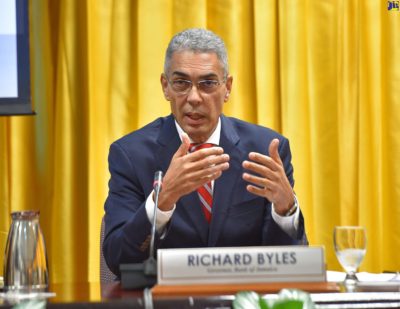 If the Bank of Jamaica in a matter of a few months got the inflation outlook so wrong what assurance can there be that the increase rates will not over impact the economy and create mayhem within the financial system?
If the Bank of Jamaica in a matter of a few months got the inflation outlook so wrong what assurance can there be that the increase rates will not over impact the economy and create mayhem within the financial system?
Jamaicans should therefore be very concerned whether the Bank of Jamaica is correctly interpreting the data that they are churning out or not and how much credibility can be afforded them in directing the country’s monetary affairs. Longer term the bank is still holding to the 4 to 6 percent target, which suggests that sooner than later rates will have to be reduced to prevent the rate from slipping under the 4 percent bottom.
They stated in their MPC release that “while headline inflation at June 2022 may be lower than expected, the Bank prefers to see evidence of a definitive fall in commodity prices, consistent with global consensus forecasts, and a reduction in core inflation before moderating the tight monetary policy stance. The Bank expects to see this in the September and December 2022 quarters and with it, a fall in inflation expectations. Of course, this depends on tensions between Russia and Ukraine not escalating.”
The MPC report goes on to say, “inflation is projected to fall within the target range by the December 2023 quarter. This is two quarters later than previously projected. Consistent with the consensus forecast for a fall in commodity prices and the Bank’s overall monetary policy stance, and absent any new shocks, annual inflation is projected to range between 9 per cent and 11 per cent for the remaining months of 2022. Inflation is projected to fall to single digits in early 2023 as long as the conflict between Russia and Ukraine does not escalate and inflation among Jamaica’s trading partners continues to fall. In addition, the Bank’s baseline forecast assumes that the public’s expectation for future inflation will fall during the second half of 2022.”
The above is not what is taking place currently.
Inflation drops again in Jamaica
 The inflation rate declined further in January, according to data released by the Statistical Institute of Jamaica (STATIN).
The inflation rate declined further in January, according to data released by the Statistical Institute of Jamaica (STATIN).
All Jamaica Consumer Price Index recorded a decline of 0.2 percent for January 2019, the Consumer Price Index compiled by Statin shows.The decline in January follows fall in November and December last year as well as declines for the first 5 months of 2018.
According to Statin, the movement was mainly attributable to a fall of 0.5 percent in the index for the heaviest weighted division Food and Non-Alcoholic Beverages, a 0.1 percent decline in the Housing, Water, Electricity, Gas and Other Fuels division and a fall of 0.6 percent for the Transport division.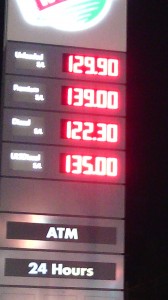
Prices trended downwards by 2.5 percent for the group Vegetables and Starchy Foods. Electricity, water and sewage rates fell and led to the groups Water Supply and Miscellaneous Services related to the Dwelling and Electricity, Gas and Other Fuels registering declines of 0.3 and 0.1 percent respectively. Lower costs for petrol resulted in the 0.6 percent fall recorded for Transport. Increased tuition fees contributed to the 1.5 per upward movement recorded for Education while the index for Miscellaneous Goods and Services went upwards by 0.3 per cent.
Inflation for the past twelve months comes out at 2.3 percent the fiscal year-to-date shows a 2.5 percent rise in prices, well down on the country’s central bank’s original forecast of 4 to 6 percent.
Prices in Jamaica plunged for December
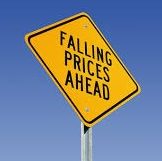 Prices in Jamaica on average, fell sharply by 1 percent in December last, bringing inflation as measured by the country’s Consumer Price Index to 2.4 percent for the calendar year. The fall in inflation for December occurred across several main categories of goods and services.
Prices in Jamaica on average, fell sharply by 1 percent in December last, bringing inflation as measured by the country’s Consumer Price Index to 2.4 percent for the calendar year. The fall in inflation for December occurred across several main categories of goods and services.
The movement in the index for the fiscal year-to-date was 2.7 percent. The rate of increase on average is well below the target set by the government for the central bank to aim at, for the fiscal year of 4 to 6 percent. Had it not been for a spike in the rate of exchange between April and September last year, the rate for the year would have been even lower than the final numbers reported.
Food and Non Alcoholic Beverages and the Transport division declined by 1.5 percent. The fall in Food and Non-Alcoholic Beverages resulted from a decline of 6.2 percent in Vegetables, Starchy Foods due to increased supplies of agricultural produce the Statistical Institute of Jamaica (STATIN) stated. The decrease in the Transport was due to lower prices for petrol, while Housing, Water, Electricity, Gas and Other Fuels fell by 1.3 percent, due mainly to reduced rates for electricity, sewage and water rates.
Inflation lowest in 32 years in Jamaica
Prices in Jamaica rose during 2015 by their lowest in 32 years. One has to go back to 1983 to find a lower rate of increase with the rate for that year was up by 2.964 percent.
Last year prices increased 3.66 percent with the rate of increase in December being 0.2 percent. A major factor in the deceleration in average prices, is the sharp fall in the price of petroleum prices on the world market as well as some other imported commodities. The decline would have been even lower but for the fact the devaluation of the Jamaican dollar would have pushed up the prices of some goods or prevented some from falling even lower than they did. in addition increased taxation also prevented prices from falling further.
In 2015, the Jamaican dollar lost 5 percent of its value with about half of the increase feeding into inflation.
Jamaica’s inflation jumps 2.1%
 Jamaica’s inflation rate for September jumped 2.1 percent, over August 2014. The sharp upward movement was impacted by 4 percent increase in the category Transport which recorded the highest movement, mainly as a result of an increase in the cost of bus fares in the Greater Kingston Metropolitan Area.
Jamaica’s inflation rate for September jumped 2.1 percent, over August 2014. The sharp upward movement was impacted by 4 percent increase in the category Transport which recorded the highest movement, mainly as a result of an increase in the cost of bus fares in the Greater Kingston Metropolitan Area.
A 3.9 percent increase for Education, due to a rise in the cost of tuition fees, at the beginning of the new school year, was another main contributor to the hike. Food and Non-Alcoholic Beverages recorded an upward movement of 2.9 percent. This was mainly attributable to the lingering impact of drought conditions island-wide, which resulted in a shortage in supply of some agricultural produce and consequently higher prices, the statistical Institute of Jamaica said in a release accompany the data.
Inflation for the year to September is now at 7.1 percent. Going forward, the fall in the price of oil to US$80 barrel, revaluation of the Jamaican dollar and improved rain fall that should result in increased farms produce, should help to ease the inflation rate, in the months ahead.
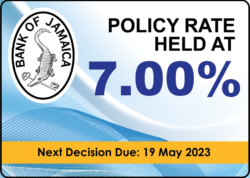 This was influenced mainly by the point-to-point inflation rate for the divisions: ‘Food and Non-Alcoholic Beverages’ (10.1%) and Restaurants and Accommodations Services’ (16.9%). These upward movements were, however, tempered by a 1.9 per cent decline in the index for the group ‘Housing, Water, Electricity, Gas and Other Fuels,“ Statin stated.
This was influenced mainly by the point-to-point inflation rate for the divisions: ‘Food and Non-Alcoholic Beverages’ (10.1%) and Restaurants and Accommodations Services’ (16.9%). These upward movements were, however, tempered by a 1.9 per cent decline in the index for the group ‘Housing, Water, Electricity, Gas and Other Fuels,“ Statin stated.